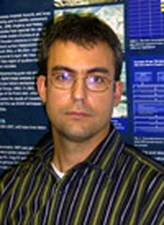Réjean Couture

The 2006 Plinius Medal is awarded to Réjean Couture in recognition of his contributions to the understanding of landslides using a combination of traditional and innovative techniques to help predict and mitigate the consequences of hazardous mass movements.
Dr. Réjean Couture has significantly contributed to the understanding of landslide phenomena in Canada. His research interests include: (i) analysis of the mechanical processes involved in large landslides, (ii) landslides mapping in permafrost areas, (iii) use of remote sensing technology for landslide mapping and monitoring, and (iv) monitoring of large and complex mass movements. To conduct these researches, Dr. Couture inventively combines a wide range of methods and techniques, including field surveys, in situ investigations, geotechnical and geo-mechanical laboratory measurements, and remote sensing technology. Dr. Couture was the first to attempt evaluating the fragmentation energy associated with large rock avalanches applying techniques used in mining and rock mechanics. Dr. Couture has conducted a multi-year ground-based monitoring survey using ground-based and InSAR technology to measure the displacement of a large debris mass resulting from a complex landslide threatening a transportation corridor in the Canadian Cordillera. Results of this research allowed local authorities to mitigate the hazards and to reduce the risk. Dr. Couture is the leader of a large landslide mapping and research project in the Mackenzie Valley, in Canada, where he is coupling traditional mapping techniques with state-of-the-art remote sensing and GIS technology to map, monitor and characterize landslides in the Canada’s permafrost terrain, contributing to the best exploitation of the area. Dr. Couture is the author or co-author of more than 60 papers and more than 30 technical and governmental reports, and he has been an active convener at EGS and EGU conferences.
